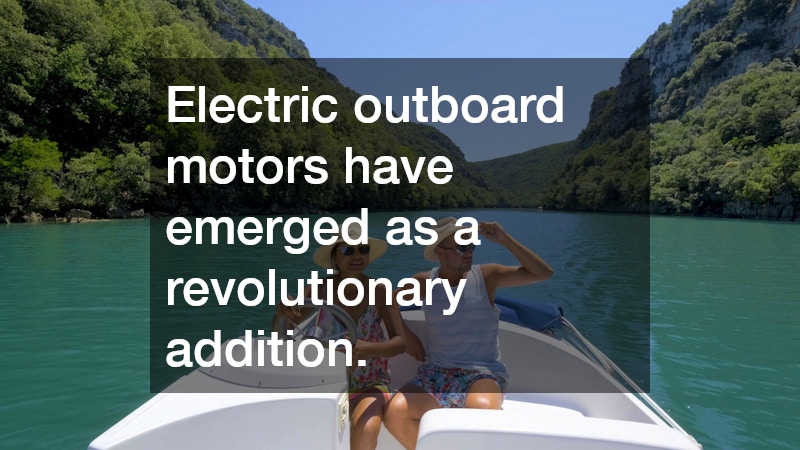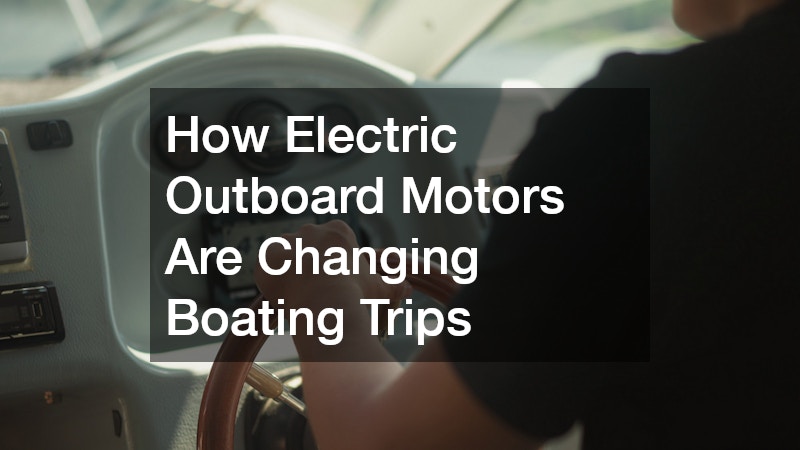With the rising awareness of environmental conservation and the demand for sustainable technologies, electric outboard motors have emerged as a revolutionary addition to the boating industry. These innovative motors are transforming the way boating activities are perceived and conducted by offering a cleaner, quieter, and more eco-friendly alternative to traditional internal combustion engines. As the popularity of electric outboard motors continues to spread, it’s essential to explore their benefits, performance in various water conditions, and their overarching influence on boating culture.
Through these insights, we aim to understand the transformative potential of electric outboard motors for a sustainable future in boating.
What are the Advantages of Using Electric Outboard Motors?
One of the most significant advantages of electric outboard motors is their unparalleled efficiency. Unlike conventional engines that rely on fossil fuels, electric motors utilize electricity, a cleaner energy source, leading to fewer emissions and pollution. This shift not only reduces the environmental footprint of boating but also helps in preserving marine ecosystems. Modern electric outboard motors are designed to deliver impressive torque at low speeds, ensuring a smoother and quieter ride that is less disruptive to aquatic life.
In addition to their environmental benefits, electric outboard motors offer substantial savings in operational costs. Traditional gasoline engines require regular maintenance such as oil changes, spark plug replacements, and fuel stabilizers. In contrast, electric motors have fewer moving parts and don’t demand such extensive upkeep, thus reducing maintenance expenses significantly. Furthermore, the cost of electricity per nautical mile is generally lower than that of gasoline, further driving down the overall operational costs for boat owners.
The reliable and quiet operation of electric outboard motors enhances the overall boating experience. Boaters no longer have to endure the constant drone of a traditional engine, allowing for more peaceful and enjoyable outings. This quiet operation also means that boaters can better appreciate nature without disturbing wildlife or fellow boaters. As the technology continues to advance, the adoption of electric motors in the boating community is likely to grow, promoting a new standard of eco-friendly and cost-effective boating.
How Do Electric Outboard Motors Perform in Different Water Conditions?
Electric outboard motors are known for their adaptability, making them highly effective across diverse water conditions. On calm water bodies like lakes, these motors excel in providing steady power and smooth acceleration, making them ideal for both leisure boating and fishing trips. The near-silent operation further enhances the experience, allowing anglers to approach fishing spots without scaring away the fish.
In the dynamic environment of rivers, electric outboard motors continue to perform robustly. Their immediate torque response is beneficial when navigating fast-moving currents or making sharp turns. Additionally, these motors have advanced control systems that offer precise steering and speed control, essential for maneuvering through narrow river passages or avoiding obstacles.
What Is the Impact of Electric Outboard Motors on Boating Culture?
The rise in popularity of electric outboard motors is gradually reshaping the culture of recreational boating. Historically, boating activities were centered around speed and power, often associated with the roar of gasoline engines. However, the transition to electric motors is introducing a paradigm shift, where the emphasis is on eco-friendliness, quiet operations, and a more immersive interaction with nature.
Community perceptions toward boating are also evolving as electric motors become more prevalent. Many boating communities are now advocating for sustainable practices, and this movement is gaining traction among environmentally conscious boaters. The reduction in noise pollution and environmental impact associated with electric motors is winning over enthusiasts who value sustainability. This shift is fostering inclusivity by making boating more appealing to a diverse demographic, including those who prioritize environmental responsibility.
Conclusion
Electric outboard motors are undeniably poised to change the landscape of boating, driving a shift towards more eco-friendly and sustainable practices. Their advantages over traditional motors are clear: reduced environmental impact, lower operational costs, and enhanced user experience. As technology continues to advance, these motors are proving capable of handling diverse water conditions effectively. The cultural impact of this transition is also significant, with a growing emphasis on sustainability within the boating community.
The potential of electric outboard motors lies not only in their engineering but also in their ability to inspire a more conscious and responsible approach to boating. As the industry continues to embrace these advancements, the future of boating is set to be cleaner, quieter, and more sustainable, offering a redefined experience that harmonizes adventure with environmental stewardship. The evolution of electric outboard motors marks an exciting chapter for boating enthusiasts, heralding a new era of innovation and environmentally minded recreation on the water.


